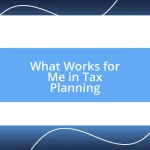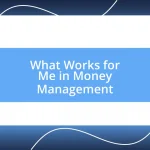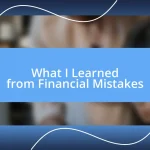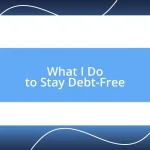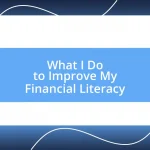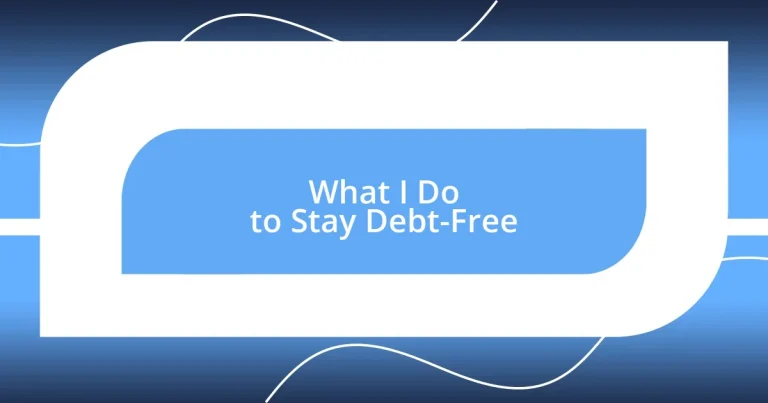Key takeaways:
- Debt-free living is a mindset that emphasizes financial wellbeing, control over spending, and finding enjoyment in low-cost experiences.
- Creating a realistic and adaptable budget helps prioritize spending, reduce financial stress, and allows for flexibility when unexpected expenses arise.
- Building an emergency fund and using credit wisely, including paying balances in full and monitoring credit utilization, contribute to long-term financial stability and confidence.
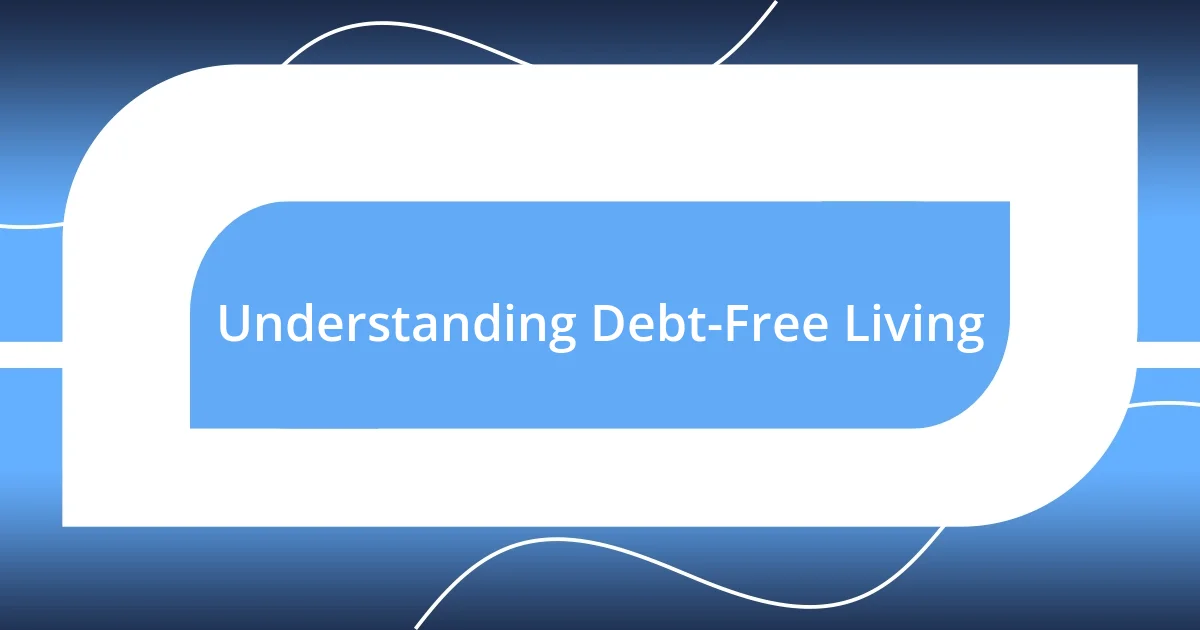
Understanding Debt-Free Living
Debt-free living is about more than just avoiding loans; it’s a lifestyle choice that prioritizes financial wellbeing. For me, achieving this meant changing how I viewed money entirely. When I started tracking my expenses diligently, I felt a sense of control and empowerment, which I hadn’t had before.
Imagine waking up each day without that nagging anxiety about bills or payments. I remember the first month I went without any debt obligations; it felt liberating. It was as if a weight had been lifted off my shoulders, showing me that freedom and peace of mind are attainable when you commit to living within your means.
Staying debt-free requires discipline, but it also fosters creativity in finding ways to enjoy life economically. Have you ever thought about how fun it can be to explore local attractions instead of costly trips? I’ve found joy in free community events, reminding me that experiences can often be richer and more fulfilling than material possessions. This shift in mindset is what truly defined my journey toward a debt-free life.
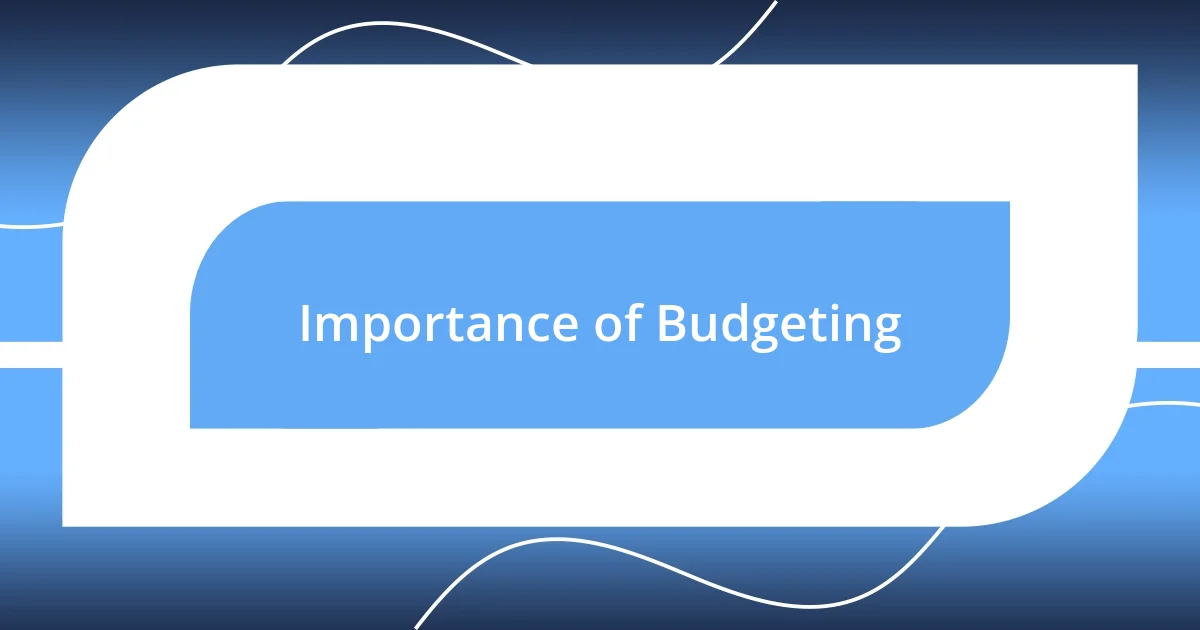
Importance of Budgeting
When I first dived into budgeting, I didn’t realize how transformative it would be for my financial health. A budget isn’t just a set of numbers; it’s a detailed roadmap for where I want my money to go. While it initially felt restrictive, I quickly learned that it actually provided me with more freedom—freedom to prioritize my spending and save for the things I truly value.
- Track Spending: I categorize my expenses, which helps me identify where I can cut back without feeling deprived.
- Set Goals: Creating short- and long-term financial goals made budgeting feel purposeful and motivating.
- Reduce Stress: I noticed a significant decline in my financial anxiety when I started budgeting; knowing exactly where my money was going brought me peace of mind.
- Flexible Adjustments: I love that my budget is a living document. It evolves with my changing needs and priorities.
Preparing a budget has reinforced my understanding of needs versus wants. I recall a time I resisted impulsively buying a pair of shoes after realizing they didn’t fit into my budget. Instead, I found that prioritizing small savings for bigger goals—like a weekend getaway—strengthened my resolve. Every time I stick to my budget, I gain a sense of accomplishment that further motivates me to remain debt-free.
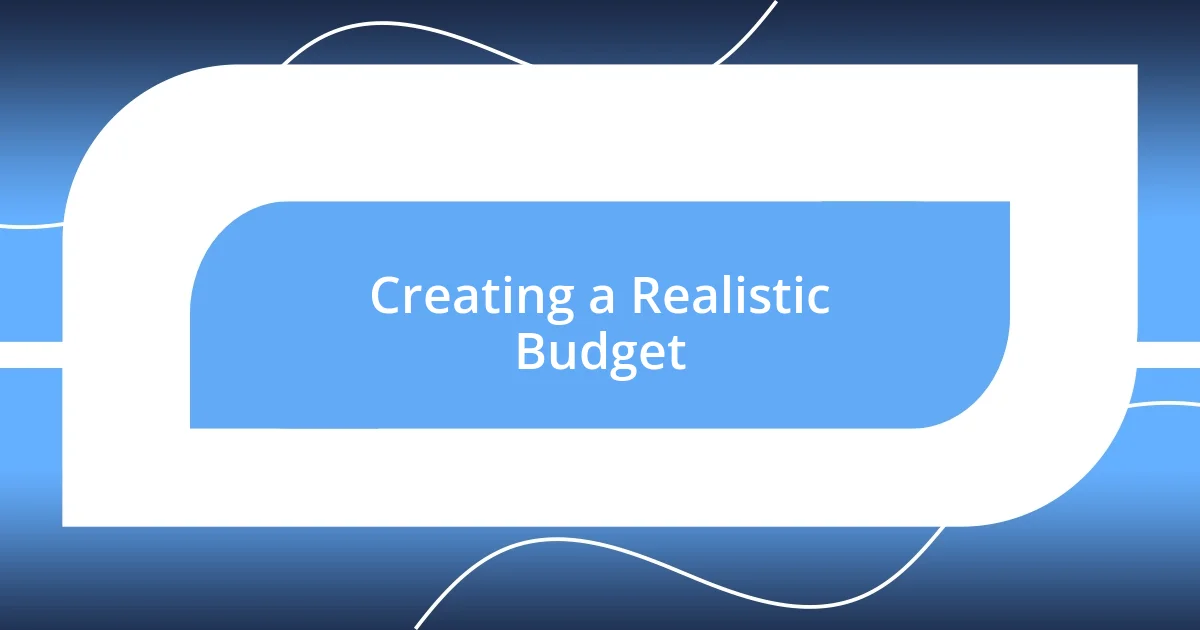
Creating a Realistic Budget
Creating a realistic budget is essential for anyone striving to stay debt-free. I’ve learned that the key to sustainability lies in creating a budget that reflects my genuine lifestyle and priorities. When I first crafted my budget, I took a hard look at my spending habits. I recall sitting with a cup of coffee, determining what truly mattered to me. It wasn’t easy at first, but breaking my expenses into categories allowed me to discover where I could trim the excess without sacrificing enjoyment.
As I built my budget, I focused on making it adaptable. For instance, I learned to anticipate fluctuating bills, like my utility costs, and incorporated a buffer into my budget for those months. I still remember a time when an unexpected car repair popped up, and because I had this flexibility in my planning, instead of feeling stressed, I managed to absorb that cost easily. I’ve found that having a realistic budget means having room for life’s surprises without derailing my goals.
The use of a budgeting app has been a game changer for me too. Keeping track of my spending on the go is empowering, and it allows me to make adjustments right away. I’m always reminded of a lovely meal I indulged in with friends, realizing I could still enjoy it because I had planned for it within my budget. This kind of planning has not only kept me in control financially; it has also enhanced my experiences, allowing me to savor those moments without guilt.
| Budgeting Aspect | Personal Experience |
|---|---|
| Tracking Spending | Identifying cuts led to unexpected savings. |
| Setting Goals | Achieving small milestones motivated me to stick with it. |
| Flexible Adjustments | Adapted my budget easily when surprises arose. |
| Using Apps | Real-time tracking kept me accountable for my spending. |
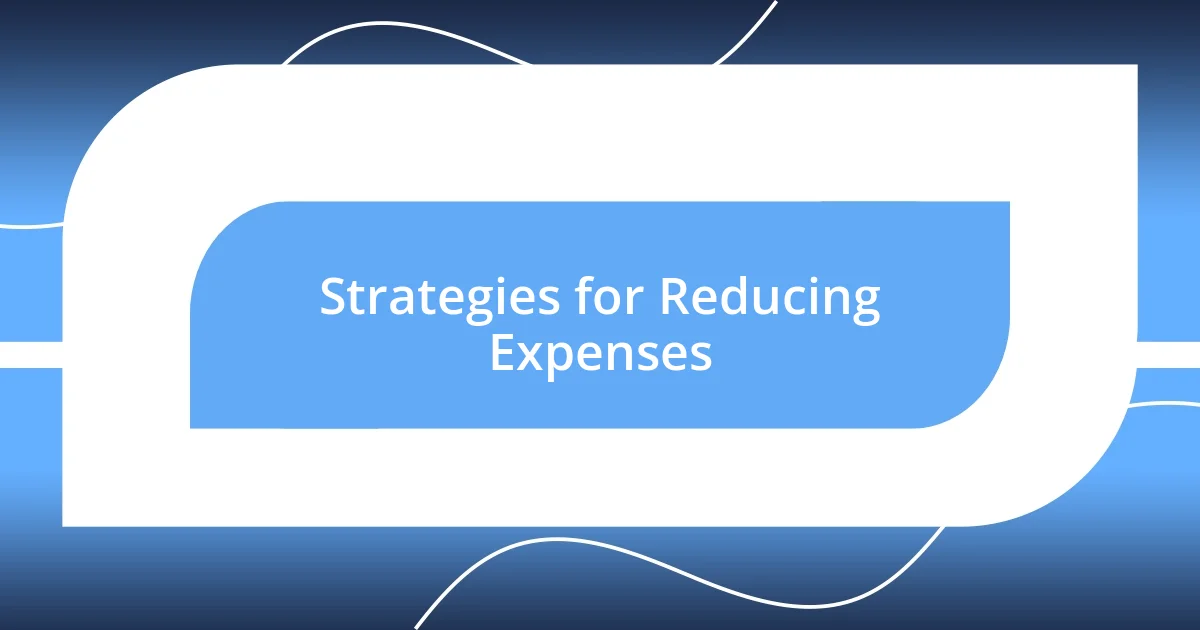
Strategies for Reducing Expenses
One approach I’ve found to effectively reduce expenses is by embracing meal planning. It might sound simple, but taking the time to plan meals for the week has saved me not just money but also the stress of last-minute decisions. I can’t help but remember how often I used to grab takeout because I hadn’t thought ahead. Now, I create a shopping list based on planned meals, which significantly cuts down on impulse buys at the grocery store.
Another powerful strategy is to reevaluate my subscriptions regularly. I once had subscriptions to streaming services I hardly used, and when I finally took a moment to analyze them, I felt a rush of relief at canceling a couple of them. Why pay for what I don’t utilize? This process not only frees up cash but also encourages me to savor the content I do choose to keep, reminding me to focus on quality rather than quantity.
Lastly, I’ve learned the true value of stepping back and assessing my spending triggers. For instance, I realized that my habit of frequent online shopping wasn’t just about needing items; it often filled an emotional void. Now, before making a purchase, I pause and ask myself, “Do I genuinely need this, or is it filling a momentary craving?” That moment of reflection has made a world of difference in keeping my spending in check, allowing me to align my expenses with my actual wants, which ultimately supports my debt-free journey.
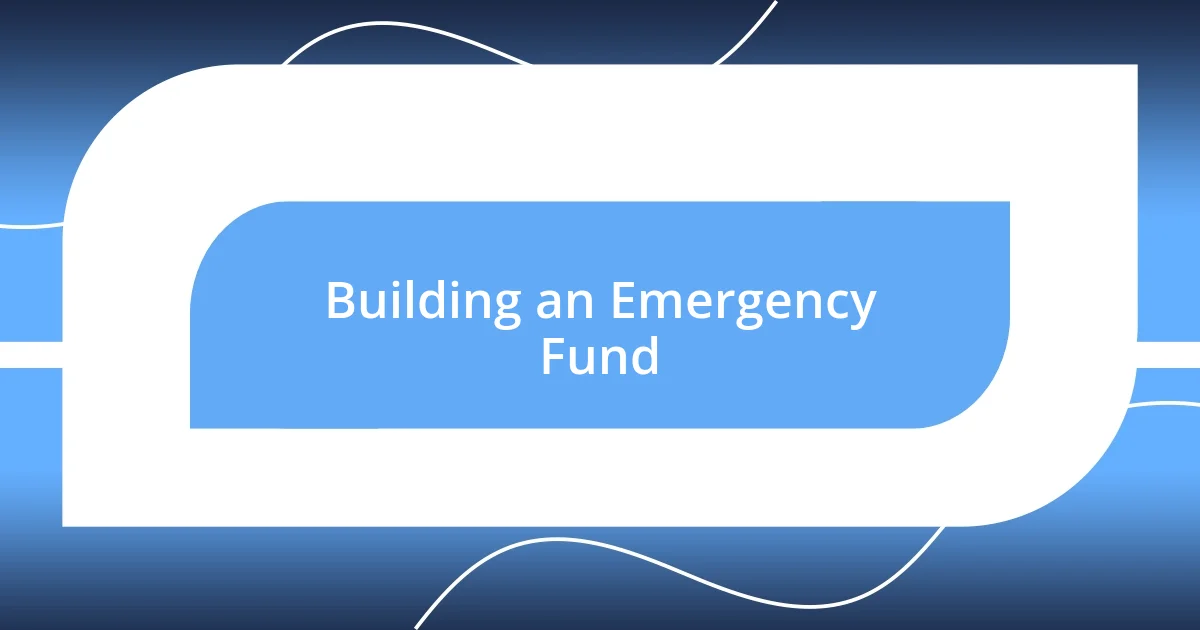
Building an Emergency Fund
Building an emergency fund has been one of the most rewarding financial decisions I’ve made. Initially, I felt overwhelmed at the idea of saving a substantial amount, but I started small, setting aside just $25 from each paycheck. This gradual approach made it feel achievable, and as I saw my savings grow, a sense of security settled in. Have you ever experienced that moment when your savings finally hit a milestone? It feels incredible!
I still remember when my dog unexpectedly needed surgery. That little emergency fund I built up really came through for me. Instead of panicking, I calmly covered the costs, knowing I had prepared for such surprises. Having that buffer not only saved me from debt but also gave me peace of mind—something that’s invaluable in today’s unpredictable world. It’s funny how saving money for those “just in case” moments can transform your mindset from stress to confidence.
To keep my emergency fund well-nourished, I’ve established a simple rule: any bonus or extra income goes directly into it. Last summer, when I received a tax refund, I knew I wanted that money to contribute to my peace of mind instead of being immediately spent on something fleeting. This habit has fostered a sense of discipline in my finances, teaching me that every little bit counts towards building a secure future. Doesn’t it feel amazing to plan for the unexpected instead of reacting to it?
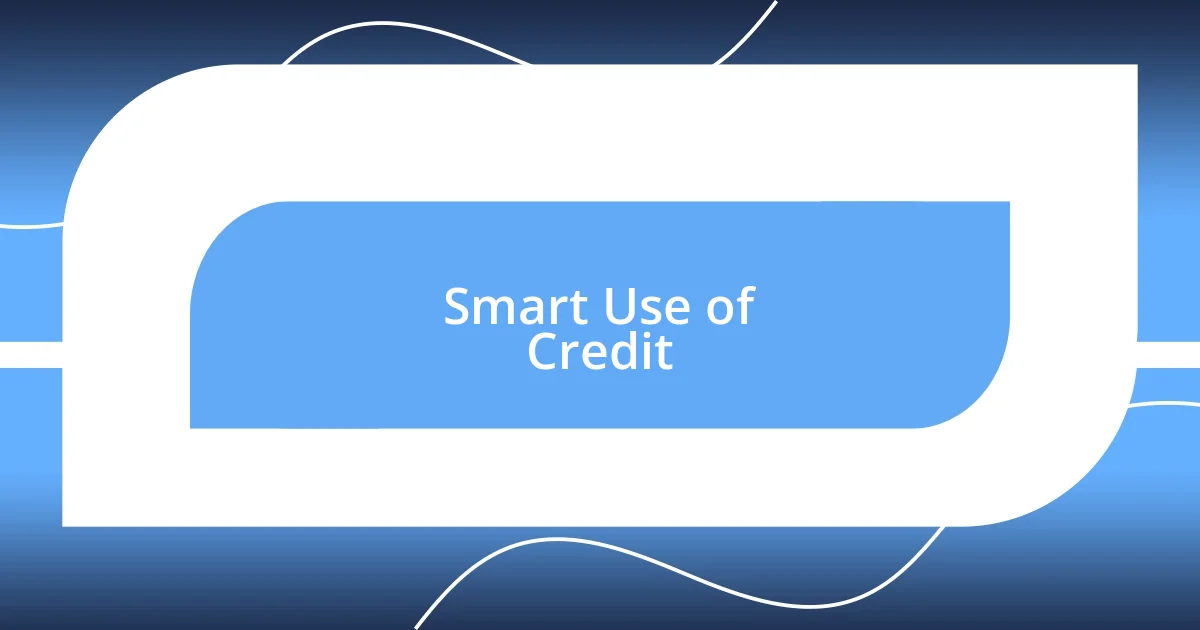
Smart Use of Credit
Using credit wisely has been a game changer for me. I’ve always made it a point to pay off my credit card balances in full each month. It’s not just about avoiding interest payments; it also helps me manage my budget more effectively. Imagine the relief of knowing that you’re not racking up debt with every swipe! This practice has empowered me to enjoy the benefits of credit card rewards without the fear of falling into a debt cycle.
I also take the time to understand my credit utilization ratio, which is a fancy term for how much credit I’m using compared to my total credit limit. Keeping this ratio below 30% has not only improved my credit score but has also made me more mindful of my spending. I remember the first time I saw my score jump because I was diligent about this—priceless. It’s almost like a game; the lower I keep that utilization, the better I feel, and the more financially stable I become.
Another trick I’ve adopted is setting alerts for payment due dates. In the past, I missed a couple of payments because life just got hectic. The stress that followed was not worth it. Now, I get reminders, and I’ve even set up autopay for essentials. It feels great to take control of my financial life. Have you tried automating your payments? It’s such a simple step, yet it drastically reduces anxiety around due dates. By being proactive in this way, I focus more on building my financial goals rather than worrying about potential financial mishaps.
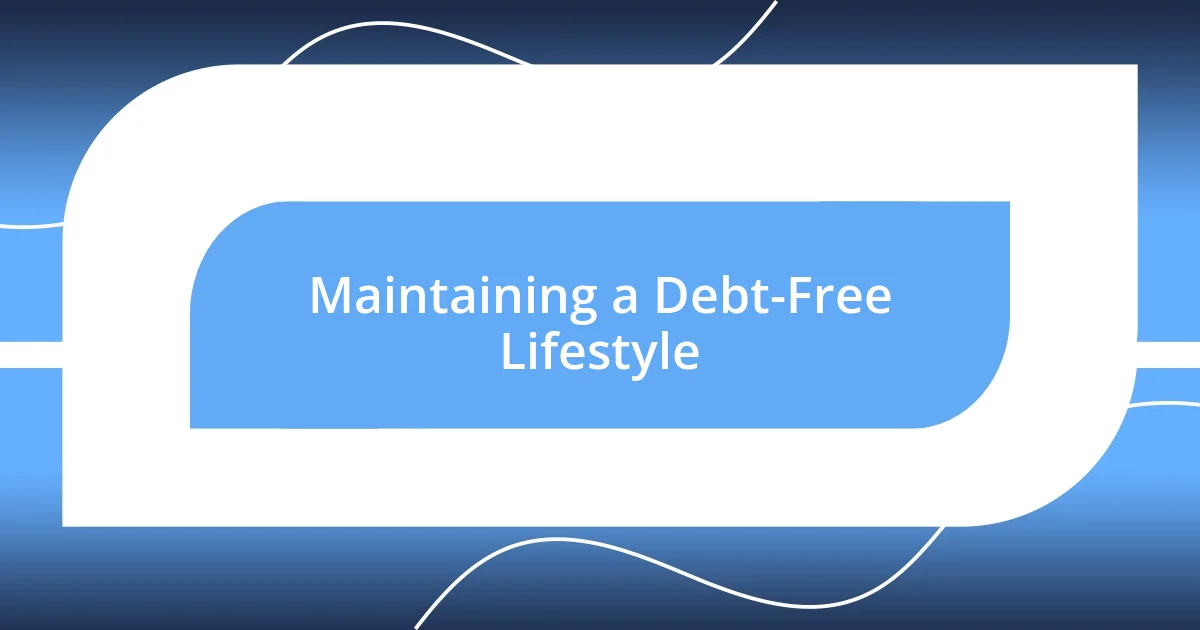
Maintaining a Debt-Free Lifestyle
Maintaining a debt-free lifestyle requires intentional habits that I’ve cultivated over time. For instance, I’ve found that sticking to a monthly budget has been crucial. Every time I sit down and track my expenses, I gain clarity and control, and this practice often reminds me of my priorities. Have you ever noticed how tempting it can be to stray from your financial goals? Budgeting has helped me resist those little indulgences that could lead me off course.
One experience that stands out is when I decided to forego a pricey gym membership and opt for outdoor workouts instead. At first, I felt a twinge of regret watching friends discuss their fancy yoga classes, but soon, I discovered the joy of running in the park while enjoying the changing seasons. In essence, this transition not only saved me money but also nurtured a healthier lifestyle. Isn’t it amazing how frugality can foster creativity and personal growth?
Additionally, I take a proactive approach to my spending by regularly reviewing my subscriptions and recurring expenses. It was eye-opening to realize how many services I was paying for but barely using. Canceling those unnecessary subscriptions freed up funds I could use toward a small getaway or a nice dinner out. Have you done a subscription audit lately? You might be surprised at what you discover, and who doesn’t love finding extra cash in their budget?
